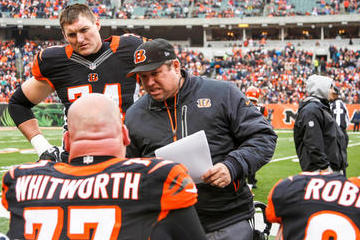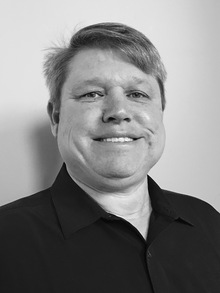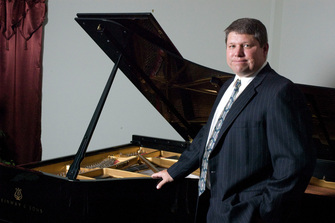
03/20/2018
Imagine a room of NFL offensive linemen.
The taped-up fingers. The knee braces. Guys who can bench-press a house.
And into that room walks Paul Alexander ’82, who wants to talk about his recent piano lesson.
Alexander, who coaches the Dallas Cowboys’ offensive line, will return to his alma mater on Tuesday, March 27 to present “Perform,” a dual lecture and concert aimed at athletes, musicians, teachers and coaches. The event begins at 7 p.m. in Old Main Brown Auditorium.
The worlds of music and sports have many parallels. Alexander has spent a lifetime studying these links, starting during his time as a physical education major and music minor, all while playing as an Academic All-American offensive lineman on SUNY Cortland’s football team.
He hopes his message resonates with students from all academic backgrounds and unlocks some of the secrets of how to perform well, be it on the athletic field, the auditorium stage or in the classroom.
“It’s about everything from slow-motion learning for developing strong neural pathways to learning total body relaxation; not only to exert force in sports, but also to create beautiful music,” Alexander said. “They are one in the same. There are a number of those parallels that I’m going to talk about.”

Alexander grew up playing guitar and singing in the school choir in his hometown of Spencerport, N.Y. Following his time at SUNY Cortland, Alexander earned a master’s degree in exercise physiology at Penn State while he served as graduate assistant coach with the Nittany Lions. He later coached at the University of Michigan and Central Michigan before taking a job as an assistant coach for the New York Jets in 1992. Alexander joined the Cincinnati Bengals in 1994 — guiding players such as Andrew Whitworth and Willie Anderson to multiple Pro Bowl appearances — and coached there through the end of the 2017 season.
At home, Alexander shares his passion for music with his wife, Kathy, and his three daughters: Mary Beth, Carolyn and Emily. In fact, his interest in the piano began when Carolyn started taking lessons as a fourth-grader in 2008. Her teacher, Albert Mühlböck, was born and trained in Vienna, Austria before he landed as a doctoral candidate at the University of Cincinnati’s College Conservatory of Music. Mühlböck was an intimidating figure to a 10-year-old girl, so Alexander tagged along for the first few lessons.
He became hooked.
How did Mühlböck hit 30,000 correct notes in a row? Where did he develop that focus?
And how, Alexander wondered, could he translate those mental traits to his offensive linemen?
So he started talking about his own experiences of learning to play the piano with his players. It all came back to the idea of performing in front of an audience, be it a silent auditorium or a stadium full of 70,000 screaming fans. What separates the best performers from the pack is their ability to concentrate on the task at hand despite the pressure.
“I’ve told them before, if you’re playing high-level piano music in a concert setting, you have to focus on nothing but the music for six minutes straight,” Alexander said. “If your mind wanders at all, you’ll make a mistake. It is so hard to focus on one thought for that long.”
“That’s what we tell them in sports, to focus. But what does focus mean?” he continued. “It’s about eliminating all the other thoughts except the one thought that’s in your head. And that gets you to perform. I would say that the focus to play six minutes of high-level music is more difficult than the focus needed on any sports play.”
Alexander summarized his philosophy in his 2011 book, Perform: NFL Coach Trains With a Concert Pianist…a Journey for Athletes, Musicians, Coaches and Teachers. He has also recorded an album, “Suite Dreams from Dad,” which he has dedicated to his daughters.
As for the person who inspired Alexander’s journey, his daughter Carolyn, well, she is currently a junior at the Berklee College of Music in Boston, Mass.

Musical talent is more common among NFL coaches than the average fan may realize. Marc Colombo, an assistant coach with the Cowboys and one of Alexander’s co-workers, sings and plays guitar in the metal band Free Reign. John Benton, the San Francisco 49ers’ offensive line coach, is an accomplished guitar player and Bob Wylie, the offensive line coach for the Cleveland Browns, plays the drums. Baltimore Ravens kicker Justin Tucker is a classically-trained opera singer.
Alexander hopes to further bridge the gap between music and sports during “Perform.” He will partner with the SUNY Cortland College-Community Orchestra to illustrate his discoveries with musical excerpts. The event will conclude with Alexander playing a movement of a Mozart piano concerto with the orchestra.
"Getting to work with Paul is exciting for everyone involved,” said Ubaldo Dante Valli, conductor of the College-Community Orchestra. “His insights into how we learn and perform are incredibly useful. Anyone, not just musicians and athletes, can benefit from his ideas. They have certainly helped me."
Alexander plays public events, primarily fundraisers, as his schedule allows. He conducted the Hamilton-Fairfield Symphony Orchestra, now known as the Butler Philharmonic Orchestra, in 2016.
In 2009, Alexander brought Mühlböck to SUNY Cortland for a free concert in the Dowd Fine Arts Center. Alexander lectured on the connections between sports and music during that visit. Now, he’ll sit behind the piano himself.
The event is sponsored by the President’s Office, the SUNY Cortland Alumni Association and the Campus Artist and Lecture Series (CALS).
Alexander has had a remarkably successful career as an NFL coach. He’s enjoyed his personal musical journey of the last 10 years, especially learning to play the piano at a high level. Most of all, Alexander thrives in his roles as teacher and coach. He wants to enlighten both athletes and musicians using the skills he learned first at SUNY Cortland.
“The training I got at Cortland in phys ed has really allowed me to be a successful NFL coach,” he said. “There are so few coaches in the NFL, a minority, who have trained as teachers or coaches. Most of them are former players that became coaches.
“Quite honestly, I think one of the reasons I was able to stay with the Bengals for 23 years and get the Cowboys job was because I learned how to teach. I learned how to analyze and prepare. I think that has set me apart from others and I learned that at Cortland. I’m very thankful for the experiences I had there.”